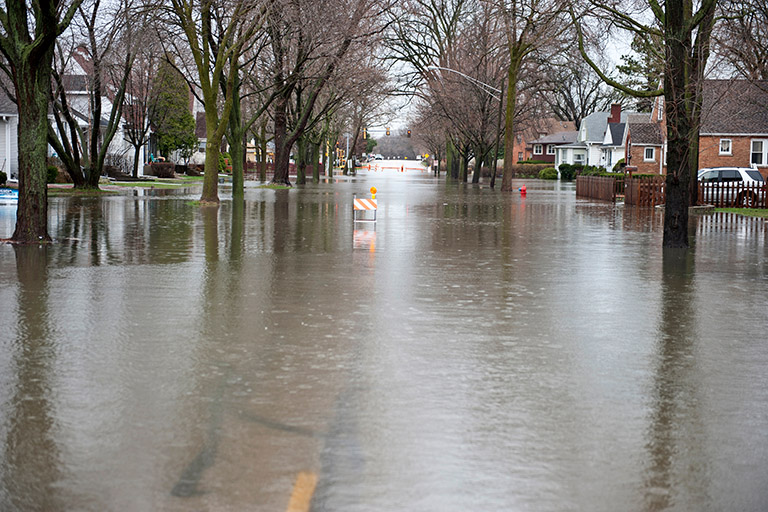As extreme precipitation becomes more common in the Midwest and across the country due to climate change, Indiana University researchers are co-leading a project to better understand and predict weather phenomena that contribute to heavy rainfall, which can cause costly and life-threatening flash flooding.
The three-year project is part of $8 million in funding announced by the US Department of Energy in August 2022 for Earth and environmental system modeling research. Collaborating institutions on the project include the University of Exeter, the University of California, Berkeley, Lawrence Berkeley National Laboratory and Pacific Northwest National Laboratory.
Since the mid-20th century, every region of the continental US has experienced an increase in extreme precipitation events, especially the Midwest and Northeast, according to the Fourth National Climate Assessment. These events threaten the lives and livelihoods of communities and add to the growing list of national disasters declared each year. So far in 2022, the US Federal Emergency Management Agency has made severe storm and flooding disaster declarations in Alaska, Puerto Rico, Montana, Oklahoma, Kentucky, and Missouri totaling hundreds of millions of dollars in aid.
Distinct weather patterns, such as weather fronts, commonly lead to precipitation events. Researchers believe the combination of two or more patterns, however, can lead to substantially more rainfall than any single weather pattern. It’s also unclear if climate change is increasing the likelihood of such a convergence.
“We know that the combination of these weather patterns happens, but we don’t know how often,” said IU Professor of Earth and Atmospheric Sciences Travis O’Brien, the project’s principal investigator. “We don’t necessarily know that they’re always stronger when they happen together—but there have been some cases where their combined force has resulted in really intense events.”
To determine how frequently these phenomena co-occur, O’Brien is leading a massive climate data analysis effort, focusing on the occurrences of four weather phenomena:
- atmospheric rivers, or narrow columns of moisture in the atmosphere;
- frontal systems, or boundaries between cool and warm fronts of air;
- mesoscale convective systems, or multiple thunderstorms occurring in tandem; and
- tropical low-pressure systems, which sometimes turn into hurricanes.
While all four of these weather patterns can create precipitation in isolation, the researchers hope to discover patterns of extreme precipitation where they co-occur.
“That would be a huge success on its own,” O’Brien said. “There’s very little in scientific literature about that.”
Beyond new knowledge, the team plans to leverage their discoveries to improve climate models’ abilities to predict extreme precipitation. Such capabilities could help policymakers and communities plan resilient infrastructure and protect citizens from the hazards of extreme rainfall.
O’Brien said he also suspects the study could improve precipitation prediction more generally.
“If we can improve precipitation prediction in these really intense situations of overlapping patterns, it will improve rainfall prediction overall for the model,” he said. “The success for this project is demonstrating that this can be done.”
About the Environmental Resilience Institute
Indiana University’s Environmental Resilience Institute brings together a broad coalition of government, business, nonprofit, and community leaders to help Indiana and the Midwest better prepare for the challenges of environmental change. By integrating research, education, and community, ERI is working to create a more sustainable, equitable, and prosperous future. Learn more at eri.iu.edu.




